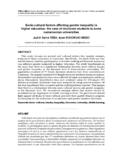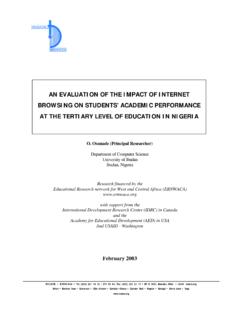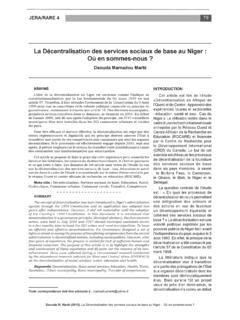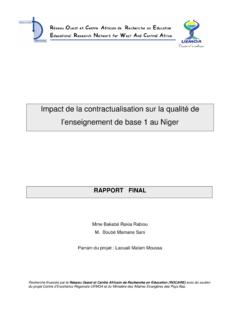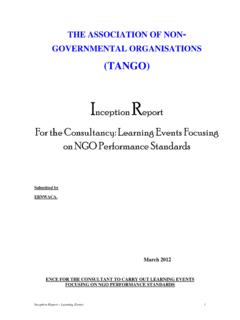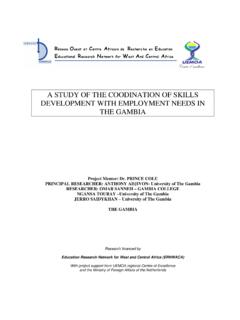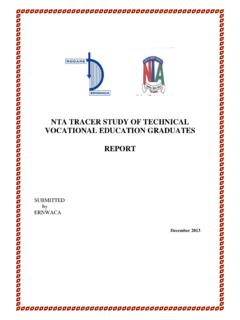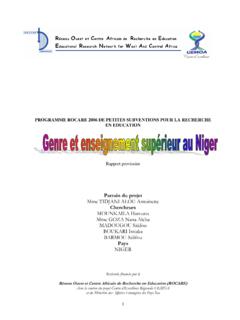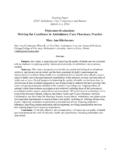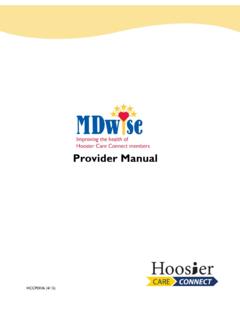Transcription of THE REPORT ON NGOs’ PERFORMANCE STANDARDS
1 REPORT SUBMITTED BY THE EDUCATIONAL RESEARCH NETWORK FOR WEST AND CENTRAL AFRICA (GAMBIA CHAPTER) THE REPORT ON ngos PERFORMANCE STANDARDS by Yves Benett with Abdoulie Bittaye Suruwa Jaiteh Ousainou Loum Makaireh N Jie Banna Sawaneh VOLUME 1: THE PERFORMANCE STANDARDS of ngos July 2012 i CONTENTS page Acknowledgements iii Acronyms iii Executive Summary iv SECTION 1:INTRODUCTION 1 THE NATIONAL CONTEXT 1 THE PRIORITY SECTORS 2 TH E NO N - GO VE RN M E NTA L O R GA NIS AT IO NS (N GO s ) 2 STATEMENT OF THE PROBLEM 4 THE GENERAL OBJECTIVES 4 SECTION 2: METHODOLOGY 5 PRELIMINARY CONSIDERATIONS 5 THE OVERALL DESIGN 7 STAGE I: The small-scale survey of ngos PERFORMANCE STANDARDS . 8 The Aim 8 The achieved sample of ngos 8 The Data Collection procedures for the survey 9 The self-completion Questionnaire 9 The Desk Study 10 The Analysis of the survey data 10 STAGE II: The Qualitative Case Studies of the PERFORMANCE STANDARDS in each Sector.
2 10 The Case Study Data 10 The Analysis of the Case Data 11 STAGE III: The development of a modular educational programme about PERFORMANCE STANDARDS 11 RELIABILITY AND VALIDITY ISSUES 12 SECTION 3: THE FINDINGS 13 THE ngos MISSION 13 THE SURVEYED ORGANISATIONS 13 The Staff establishment 15 The Programmes/ Services 15 THE MANAGEMENT OF ngos 17 Strategic Planning 17 Quality Assurance 17 Monitoring the quality of provision 17 Monitoring progress against action plans and budgets 18 Resources 18 Financial and physical resources 18 Human Resources 19 Efficiency and Effectiveness 22 Efficiency 22 Effectiveness 24 ii SECTION 4: PERFORMANCE STANDARDS FOR ngos 25 INTRODUCTION 25 MISSION, VALUES, AND OBJECTIVES 26 Mission 26 Values 26 Objectives 26 PERFORMANCE STANDARDS FOR GOVERNANCE 27 Planning 28 PERFORMANCE STANDARDS FOR MANAGEMENT 28 Leadership Style 29 Communication 29 Management Control 30 Administrative Support 30 External Relations 30 Advocacy/Lobby and/or Resource Mobilisation 31 Quality Assurance 31 Validation 31 Monitoring 31 PERFORMANCE STANDARDS FOR RESOURCES 32 Financial and Physical resources 32 Human Resource management 33 Staff Development 33 Gender empowerment 34 PERFORMANCE STANDARDS FOR OUTCOMES 34 SECTION 5.
3 CONCLUSION AND RECOMMENDATIONS 35 CONCLUSION 35 RECOMMENDATIONS 36 Governance 36 Accountability 36 Quality Assurance 36 PERFORMANCE STANDARDS 37 Monitoring and Evaluation 37 Advocacy/Lobby and/or Resource Mobilisation 37 Resources 37 Financial and Physical resources 37 Human Resources (Staff Development) 38 References 38 APPENDICES 39 APPENDIX I THE SELF-COMPLETION QUESTIONNAIRE FOR MANAGERS APPENDIX IITHE MANAGEMENT OF ngos (from the Self-Completion Questionnaire) APPENDIX III THE INTERVIEW GUIDE FOR MANAGERS APPENDIX IV THE INTERVIEW GUIDE FOR CLIENTS iii Acknowledgements The Educational Research Network for West and Central Africa (ERNWACA) is grateful to TANGO for the contract for this very challenging consultancy.
4 We are also grateful to the respective Ministries and line Departments of State for Agriculture, Education and Health, and to the NGO Affairs Agency, for their co-operation. This consultancy could not have been undertaken without the collaboration of the participant NGO Managers and Clients, and we extend our sincere thanks to all of them. We owe a deep gratitude too to the Principal Researchers who undertook the fieldwork and contributed to the Project Team s deliberations. They were Messrs Abdoulie Bittaye, Suruwa Jaiteh, Ousainou Loum and Banna Sawaneh. We also wish to put on record our sincere thanks to Dr Yves Benett, UK-based International Education Consultant and Scientific Adviser to ERNWACA for his leadership during this project.
5 Our thanks go too to Mrs Haddy Sillah (in The Gambia), and to Mrs Evelyn Benett (in the UK), for their professional secretarial support throughout the consultancy. Makaireh N Jie National Co-ordinator for ERNWACA (Gambia Chapter) Acronyms DSFEA Department of State for Finance and Economic Affairs NTA National Training Authority MoHERST Ministry of Higher Education, Research, Science and Technology PAGE Programme for Accelerated Growth and Employment Pro-PAG Pro-Poor Advocacy Group PRSP Poverty Reduction Strategy Paper RoG Republic of The Gambia SPACO Strategy for Poverty Alleviation Co-ordinating Office TANGO The Association of Non-Governmental Organisations TVET Technical Vocational Education and Training iv THE REPORT ON ngos PERFORMANCE STANDARDS EXECUTIVE SUMMARY Introduction This two-month consultancy was sponsored by TANGO.
6 In agreement with the World Bank as the administrator of grant funds provided by Japan under the Japan Social Development Fund. According to the terms of reference for this consultancy the focus was to be on the PERFORMANCE STANDARDS of ngos and on the development of a modular training programme for NGO staff. The present set of documents is an outcome of this consultancy. The REPORT is in two volumes, with VOLUME 1 giving an account of the fieldwork about ngos PERFORMANCE STANDARDS , and VOLUME 2 outlining a proposal for an appropriate modular training programme for NGO staff. VOLUME 1 The PERFORMANCE STANDARDS of ngos VOLUME 1 describes and analyses the management data obtained from a stratified, random, sample of 20 ngos in three sectors (Agriculture, Education, and Health).
7 The methods used were: (a) A Desk Study of relevant documents (b) A quantitative survey of NGO Managers views on various aspects of their organisations, through a self-completion Questionnaire (c) Case Studies of the targeted organisations through semi-structured, individual interviews of the organisations Managers and of their Clients about the delivery of the organisations programmes/services. The strengths and weaknesses of the sampled organisations were identified and highlighted. Whilst there was much evidence of good practice, there were areas of weakness and, consequently, recommendations were made of ways of bringing about improvements. The recommendations covered the areas of Governance, Accountability, Quality Assurance and Resources (in particular, human resources and the imperative of a Staff Development policy for the non-support staff).
8 V VOLUME 2 The proposed modular training programme The proposed programme focuses on topic areas deemed important for an understanding of the many issues that underpin the establishment, maintenance and improvement of PERFORMANCE STANDARDS at both programme/service level and organisational level. The modules are as follows: Module 1: Perspectives on Assessments and PERFORMANCE STANDARDS Module 2: Quality Assurance and Accountability Module 3: Learning events, Work-based learning and Reflective learning Module 4: The politics of PERFORMANCE Assessments in organisations Module 5: Staff Development Dr Yves Benett UK based International Education Consultant 1 THE REPORT ON ngos PERFORMANCE STANDARDS SECTION 1: INTRODUCTION This two-month consultancy was commissioned by TANGO inits resolve to implement its national project for enhancing ngos efficiency and accountability in delivering basic services to the poor in The Gambia.
9 The consultancy was undertaken in agreement with the World Bank and with a grant from the Japan Social Development Fund. THE NATIONAL CONTEXT The Gambia is among the poorest countries in the world (RoG, 2011). However, over the past years, various policies, strategies, and programmes (such as VISION 2020, PRSPII, MDGs, PAGEand sector policies in, respectively, Agriculture, Education and Health) have been developed, adopted and implemented ; and the Pro-Poor Advocacy Group was set up by a number of CSOs, Government, Donor institutions, the Media, and individuals to address the problem of poverty (PRO-PAG, 2006). Indeed, the pillars of the strategy for poverty alleviation had long been defined after various studies under the Social Dimensions of Adjustment had been undertaken in the early 1990s, and the government had launched a national dialogue with the assistance of UNDP in order to engage citizens on poverty issues and appropriate interventions (DSFEA, 2002).
10 Key elements of the priority programmes in Agriculture, Education, and Health (complemented by a cross-cutting programme in Nutrition, Population and HIV-AIDS) were implemented under the aegis of the Strategy for Poverty Alleviation Co-ordinating Office (SPACO). This national dialogue had been an important source of information for SPACO as Village Development Groups, Community-Based Organisations (CBOs), ngos and Government extension staff forged working relationships at local community level; and at district level, District Development Committees (formed through the collaboration between government departments and ngos ) brought together federated CBOs and co-operative groups , thus linking the strategy for poverty alleviation with the grassroots.
